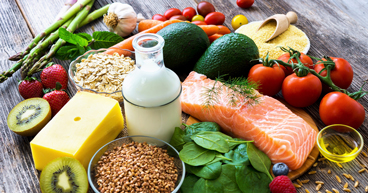
The United States is a nation with a sweet tooth. Estimates vary, but some say the average American consumes about 17 teaspoons of sugar daily, while an analysis from the U.S. Department of Agriculture estimates the average is as high as 34 teaspoons a day. These numbers are up to six times higher than those recommended by the American Heart Association, which suggests no more than six teaspoons (25 grams of sugar) a day for women and nine teaspoons (38 grams of sugar) a day for men.
While no evidence has been found that sugar causes or even helps cancer grow, it may contribute to an unhealthy lifestyle that increases cancer risk. For instance:
- Too much sugar may contribute to weight gain and obesity, one of the most significant lifestyle risk factors for developing cancer.
- Research suggests that diets high in added sugars tend to be low in important nutrients, including calcium, vitamin A, zinc and fiber. A healthy diet is considered key to helping reduce cancer risk.
“While we don’t recommend avoiding all types of sugars, there are healthy ways to satisfy a craving for something sweet,” says Kara Sonntag, Registered Dietitian at Cancer Treatment Centers of America® (CTCA). “For example, fruits have sweet flavors and provide important health benefits in the forms of antioxidants and phytonutrients both of which are known to be associated with cancer risk reduction.”
In this article, we’ll explore the differences in various types of sugar and what role, if any, sugar plays in cancer. Topics include:
- Refined sugars vs. natural sugars
- What is refined sugar, and which foods include it?
- What is natural sugar, and which foods include it?
- Are artificial sweeteners a better choice?
- Does your metabolism matter?
- Why is too much sugar bad for you?
- Is there a connection to cancer?
If you’re interested in learning more about the nutritional support or other integrative care services we offer cancer patients at CTCA®, or if you want a second opinion about your cancer diagnosis and treatment plan, call us or chat online with a member of our team.
Refined sugars vs. natural sugars
Sugar, in all forms, is a simple carbohydrate that the body converts into glucose and uses for energy. But the effect on the body and your overall health depends on whether you’re eating either:
Natural: Naturally occurring in fruits and other foods
Refined: Processed so they can be more easily packaged or added to foods and beverages
What is refined sugar, and which foods include it?
Refined sugar comes from plant sources, such as cane or beets. The harvested plants are cleaned and cooked, and the sugary juices are extracted. The liquid is further processed until the liquid crystalizes. The crystals are spun to remove the liquid, which becomes molasses, leaving behind dried sugar crystals.
Refined sugar that comes from cane or beets is usually sucrose, the combination of glucose and fructose. White and brown sugars are used to sweeten cakes and cookies, coffee and cereal. Food manufacturers add other sugars, such as high-fructose corn syrup, to foods and beverages, including crackers, flavored yogurt, tomato sauce and salad dressing. Low-fat foods may often have high sugar content to add flavor lost by reducing fat.
These sugars are also listed under the category of “added sugars” on nutrition labels. The World Health Organization’s (WHO) dietary guidelines recommend that added sugars make up no more than 10 percent of a person’s daily calories. For “additional health benefits,” the WHO recommends that the sweetener makes up no more than 5 percent of a daily diet. For a 1,500-calorie diet, the 10 percent cap means no more than 150 calories, or 38 grams of sugar. The 5 percent limit would mean half that amount.
Refined sugars and sweeteners come from many other sources, too, including corn and agave.
Health-conscious people searching for a natural sweetener have probably used agave nectar. In recent years, agave has been touted as a natural sugar substitute that can be added to beverages, baked goods and other sugary foods in need of a boost of sweetness. Agave has a low glycemic index, meaning it’s less likely than other sweeteners to spike blood sugar levels. But most agave products are highly processed from the root of the agave plant, producing a refined sweetener like high-fructose corn syrup.
What is natural sugar, and which foods include it?
Natural sugars are found in fruit as fructose and in dairy products as lactose. Many dietitians recommend eating six to nine half-cup servings of fruits and vegetables each day.
Dairy products with lactose include milk, yogurt and cheese, which are also high in protein. These dairy products are sometimes high in fat, so consider fat-free or low-fat varieties.Foods with natural sugar play an important role in the diet of cancer patients and anyone trying to reduce their cancer risk because they’re often high in fiber and nutrients.
Remember that your body is getting sugar from other sources, too. It breaks down carbohydrates—found in breads, pastas, potatoes and rice—into simple sugars, which then turn into glucose.
Sonntag encourages patients and families to create a healthy relationship with food as the overall goal instead of trying to completely avoid all sugars. Include a fruit or a vegetable at each meal and snack. Rather than obsessing over grams and teaspoons of sugar, focus on reducing added sugars by limiting access to products that contain them. This first step begins as an informed consumer in the grocery store.
Are artificial sweeteners a better choice?

Sit down at a table or counter at many restaurants or diners, and you may see a bowl containing a rainbow of sugar substitute packets. Those that are:
- Pink contain saccharin (Sweet ‘N’ Low®)
- Blue contain aspartame (Equal®)
- Yellow contain sucralose (Splenda®)
- Green contain stevia (Truvia®)
- White contain sugar
Many people prefer to use one of these substitutes in place of the white sugar packets. These substitutes have no nutritional benefit, but they do add sweetness to beverages like coffee or tea without the 16 calories that come with a teaspoon of sugar.
You may have heard that artificial sweeteners can cause cancer. However, according to the National Cancer Institute, there’s no clear scientific evidence that sugar-free sweeteners cause cancer. Experts do recommend that people consume artificial sweeteners in moderation.
Metabolism matters
How the body metabolizes the sugar in fruit and milk differs from how it metabolizes the refined sugar added to processed foods. The body breaks down refined sugar rapidly, causing insulin and blood sugar levels to skyrocket. Because refined sugar is digested quickly, you don’t feel full after you’re done eating, no matter how many calories you consumed. The fiber in fruit moves slowly through your stomach, which may help you feel full longer.
But there’s a caveat. Once the sugar passes through the stomach and reaches the small intestine, it doesn’t matter if it came from an apple or a soft drink.
How much sugar is already in your blood determines how the body uses the sugar. If you already have a lot of sugar in your system, then what you just digested will form either fat or glycogen, the storage form of glucose that’s used for quick energy. It doesn’t matter if it’s junk food or fruit.
Why is too much sugar bad for you?
Foods high in added sugars tend to be heavily processed and low in nutrients, and they may also be high in unhealthy fats. These foods offer little nutritional value and may fill you up and take the place of nutrient-dense foods in your diet.
Excess sugar may lead to unhealthy weight gain, forming fat around the midsection, and high blood-sugar levels, which may cause insulin resistance. Research shows that limiting your intake of added sugars reduces your risk of becoming overweight or obese or developing tooth decay. Excessive sugar consumption has been linked to a higher risk of chronic diseases and conditions—in part by increasing the risk for metabolic syndrome—including:
Heart disease: The risk of heart disease increases among those who get more than 25 percent of their daily caloric intake from added sugars.
Type 2 diabetes: The risk of diabetes may be reduced by limiting added sugar intake to 5 percent of total daily calories, which improves glucose tolerance and decreases the prevalence of diabetes and related metabolic abnormalities.
Non-alcoholic fatty liver disease (NAFLD): Large amounts of added sugars such as fructose may create a buildup of fat in the liver, which may increase the risk of this disease. Carrying extra weight and being inactive also may increase risk. Those with NAFLD may benefit from reducing their sugar intake.
High blood pressure and metabolic dysfunction: Added sugars may increase blood pressure, heart rate, inflammation, insulin resistance and “broader metabolic dysfunction,” according to a review in the journal Open Heart.
Cancer connection
Americans eat more refined sugar today than their parents and grandparents did three decades ago, which has resulted in increasing obesity rates among adults and children. Obesity has been associated with several specific types of cancers, including:
- Breast cancer
- Prostate cancer
- Uterine cancer
- Colorectal cancer
- Thyroid cancer
- Gallbladder cancer
- Ovarian cancer
- Multiple myeloma
- Kidney cancer
- Liver cancer
There’s some evidence that consuming large amounts of sugar that produce a high glycemic index—rapidly increasing blood sugar levels—may be associated with an increased risk of certain cancers, including esophageal cancer and pancreatic cancer.
No conclusive research has found that sugar causes cancerous cells to grow or feeds tumors. While it’s true that cancer cells need sugar to grow, the same could be said for most normal cells in the body. If you were to avoid all sources of natural carbohydrates and sugars found in grains, vegetables, fruits, milk and beans, you’d starve healthy cells, which may result in malnutrition.



